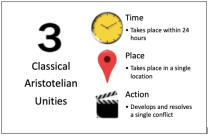Lockdown boredom reached such levels today that I just had to deviate from the routine on the blog to provide both myself and you with a change of scenery. Ladies and gentleman, please enjoy literature discussed – in the form of infographics!

The Classical Unities
But before we start with any infographics, let’s just remind ourselves of those old grammar school days when such concepts as the classical unities were still actually taught in literature classes*.
The Classical Unities, also known as the Aristotelian Unities, and also – not very originally – known as the Three Unities, are the idea, originating in Aristotle’s Poetics, that a good tragedy should have unity of time, unity of place and unity of action. What these exactly mean, you’ll see illustrated below, but first we might as well pickup our trusty old Poetics and read what Aristotle actually wrote:
Aristotle on the Classical Unities

On the Unity of Time:
…Tragedy endeavours, as far as possible, to confine itself to a single revolution of the sun, or but slightly to exceed this limit…
(Aristotle: Poetics, V)
On the Unity of Action:
…Tragedy is the imitation of an action; and an action implies personal agents, who necessarily possess certain distinctive qualities both of character and thought; for it is by these that we qualify actions themselves, and these—thought and character—are the two natural causes from which actions spring, and on actions again all success or failure depends. Hence, the Plot is the imitation of the action: for by plot I here mean the arrangement of the incidents.
…Now, according to our definition, Tragedy is an imitation of an action that is complete, and whole, and of a certain magnitude; for there may be a whole that is wanting in magnitude. A whole is that which has a beginning, a middle, and an end. .. A well constructed plot, therefore, must neither begin nor end at haphazard, but conform to these principles.
…Unity of plot does not, as some persons think, consist in the Unity of the hero. For infinitely various are the incidents in one man’s life which cannot be reduced to unity; and so, too, there are many actions of one man out of which we cannot make one action. Hence, the error, as it appears, of all poets who have composed a Heracleid, a Theseid, or other poems of the kind. They imagine that as Heracles was one man, the story of Heracles must also be a unity. But Homer, as in all else he is of surpassing merit, here too—whether from art or natural genius—seems to have happily discerned the truth. In composing the Odyssey he did not include all the adventures of Odysseus—such as his wound on Parnassus, or his feigned madness at the mustering of the host—incidents between which there was no necessary or probable connection: but he made the Odyssey, and likewise the Iliad, to centre round an action that in our sense of the word is one.
As therefore, in the other imitative arts, the imitation is one when the object imitated is one, so the plot, being an imitation of an action, must imitate one action and that a whole, the structural union of the parts being such that, if any one of them is displaced or removed, the whole will be disjointed and disturbed. For a thing whose presence or absence makes no visible difference, is not an organic part of the whole.
(Aristotle: Poetics, VI-VIII)
On the Unity of Place:
Yep. All of that.
The Aristotelian Unities
Good old Aristotle never mentioned unity of place. Perhaps he took it for granted. After all, once you’ve got unity of action (clearly the most important thing) and unity of time, how far can you spread it geographically?
Nevertheless any budding writer would do well to chew his way through Aristotle’s Poetics, because the one thing you can notice while he disperses poetic advice with a liberal hand, is that quite a lot of those things which he criticises as ‘bad’ are standard features of a certain kind of literature, ahem, ahem, you know, the kind which is published with glaring metallic letters on the front cover and has no literary merit whatsoever. So if you’re aiming to win, I don’t know, the Booker Prize, you’d better follow Aristotle’s advice; if on the other hand, you’re aiming to be published by Mills & Boon, you’ll do well to follow the exact opposite of his advice…
The Three Unities:
Now then when people started to read Aristotle again in Europe, almost two millennia years later, the third unity was most definitely added, and gained particular popularity in France where several famous playwrights did their best to adhere to it, so if you go out – what am I saying?! You can’t go out and see a play any more, classical French or otherwise.
So to the devil with that, let’s proceed to the illustrations:
Seven Ways to Illustrate the Classical Unities
Click on the gallery to enlarge the pictures.
Notes: * You can tell that this post has been inspired by the lack of such things in the literature curriculum of Young Friend of the Elephants - currently home schooling owing to the coronavirus - or, for that matter, in Sophisticated Young Lady's, several years earlier (at the time not home schooling owing to no coronavirus). Further Reading (or Other People's Take on the Same Topic): ⇒ The Unities and the Short Story ⇒ Classical Unities ⇒ Aristotle's Poetics: The Three Unities
















![The Warriors of Salamis (Achilles Vasileiou), battle monument on the island of Salamis. Photo by Sculptureholic via Wikipedia [CC BY-SA 4.0]](https://waterbloggedbooks.files.wordpress.com/2017/02/the-warriors-of-salamis.jpg?w=640)

